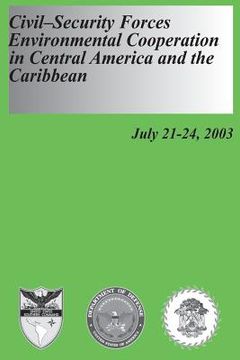Civil-Security Forces Environmental Cooperation in Central America and the Caribbean - July 21-24, 2003
Synopsis "Civil-Security Forces Environmental Cooperation in Central America and the Caribbean - July 21-24, 2003"
This conference is the fourth in a series of conferences sponsored by the U.S. Southern Command in Central America. As such, it built upon the relationships and programs initiated in earlier conferences. The purpose of these conferences is to support three growing realizations: that the protection of the environment is critical to the sustainable development of the entire region, which is, in turn, critical to regional stability; that environmental issues are best dealt with on a regional basis; and that military and security forces have a vital role in the process of resolving environmental issues. Given the disparate stakeholders in the environment, it is difficult enough to arrive at a common strategy within any given nation. Yet these conferences seek an even higher aim, to devise a common regional strategy for environmental security for Central America and, beginning with this conference, the Caribbean basin. Progress is already being made. In 2004, a training program, developed and validated through the agency of these conferences, will provide training on environmental issues to thirty-five military and security officers who will, in turn, take that training back to their respective units: the "train the trainer" methodology. As a result of this conference, the participants plan to exploit the networking and collaboration capabilities of the U.S. Department of Defense DENIX network to maintain the momentum for planning, and there is consideration for a small-scale demonstration project. Certainly, issues remain. First, is the issue of resources. Initially, at least, there is little hope that there will be significant increases in budgeting that would support such efforts. This means that the solutions must reflect innovative usage of the resources already available, including resource sharing-information, technology, specialized equipment, and even manpower-between nations. Second is the issue of identity; while the participation in these conferences continues to grow, as yet, it remains only a series of conferences. To gain traction with the many organizational stakeholders, the effort will need to coalesce into an organization with a mission, a vision, and terms of reference. Finally, there is the issue of leadership, which must take into account the sovereignty of any participating nation. As environmental problems are transnational, they require a regional response; a regional response requires regional leadership. Such leadership, can either come from inside this group of participants or from outside. That is, the participants can either organize themselves and select their own leadership, or they can seek to be recognized by a regional, transnational organization. In either case, it will require leadership to determine a mission, create a vision, and establish terms of reference to convert these conferences into future action. These issues and more will certainly be topics of future conferences. The wheels of international cooperation grind slowly, but thanks to the outstanding efforts of the many participants of this conference and those that preceded it, the hardest part is done. A start has been made, and this bodes well for every citizen of the region and, indeed, of the world.

